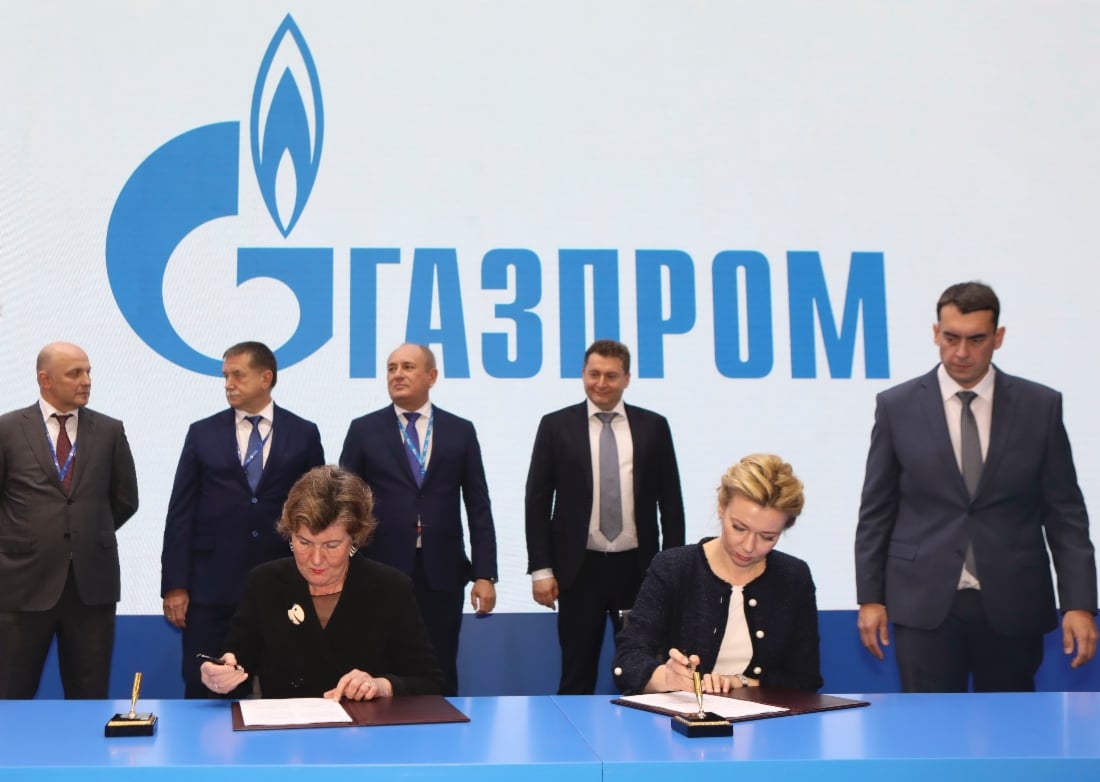How Putin profits from The Sound of Music
NewsIN a fascinating exposé in Der Standard by Axel Brüggemann shows how the Russian president has much of the Austrian music establishment dancing to his tune.
Extract:
When Helga Rabl-Stadler sat in St. Petersburg in 2019 to sign a lucrative sponsorship contract with Gazprom (pictured) as President of the Salzburg Festival, she probably had no idea that she was using her name to authenticate the strategic infiltration of the Austrian cultural and classical scene by Russia.
… Former Chancellor Wolfgang Schüssel (ÖVP) introduced Helga Rabl-Stadler to the Russian businessman Dmitri Aksenow, who founded the “Society of Russian Friends of the Salzburg Festival” in 2013 and from then on co-financed selected productions – preferably when the Greek-Russian conductor Teodor Currentzis was involved.
…”We didn’t understand it at first,” says investigative journalist Frederik Obermaier, who works for Der Spiegel , “but classicism has turned out to be the perfect place for this kind of business: people ascribe selfless humanism to it, and it goes without saying that Politicians and business leaders move in this cosmos.”
An ideal realm of shadows, a niche without public interest and investigative journalism: Putin’s propagandists recognized this early on and robbed music of its innocence – preferably in Austria….
Read on here






Disgusting indeed.
Classical music, which indeed is a product of European humanism, is an ideal disguise for the forces who want to destroy this humanism – it is the Enemy, demanding evolution to a better society, which would unravel the network of base interest and barbarism. And what would be a better disguise than infiltrate in the historic heart of the classical tradition? Also the nazis understood this form of disguise very well.
That is why the classical music world needs a strong, penetrating, merciless journalism that examines its sources and motivations.
Good luck on that. They can;t even tackle the problem of flying musicians and their instruments from point A to point B.
Strong, penetrating, merciless journalism is absolutely right, which is why there absolutely needs to be fewer of these ideologically deluded, woke, left-green filthy schmocks.
John: think og it, art has been sponsored by tyrants throughout history…
If you want the real reason this story happens, look no further than that comment. Classical music is full of people with no real-world economic or political nous, whose heads are either too high in the clouds or stuck self-interestedly somewhere it would be impolite to describe, to actually notice what’s going on.
Same reason magnates in the USA “support” the arts.
I m afraid you don t understand the difference between the motives of Russian magnates versus USA magnats”supporting” arts
Which difference? Imperialism is in the mind of either. The Americans only for a long time produce the better candy and circuses for the masses. Abu Ghreib, My Lai anyone?
Explain please!
If the Salzburg Festival does not like the Gasprom sponsorship, the solution is simple: return all the money.
Serious question: what avenues does classical music (inc opera, ballet etc) have to achieve financial viability?
I think it is obvious that infrastructure, logistics, and performances are high cost, and ticket sales to the minority who enjoy and can afford to go does not in general cover the cost. Often not even the incremental cost.
So the options are
I) populism in repertoire, staging or artists – which some enjoy and others criticise,
Ii) public grants – which are increasingly scarce, have to be balanced against the good that could be done by spending the money in other areas, and creates an often unhealthy dependence on politicians.
Iii) sponsorship by companies and institutions – which will only happen if the sponsors get something back in return. This will usually be some form of influence, advertising or reputation-washing.
Iv) sponsorship by private donors – some of whom do it for the love of music, and others are more like corporate sponsors, as above.
Is there a viable way to finance classical music in the future without compromising on some or all of the above ?
There is no absolutely ‘secure’ way of financing classical music. The only option is to have different sources of funding in the same time so that the risks are spread: state funding as a survival basis, sponsoring for projects, donations for the rest of the budget. And shrinking the seasons to avoid budget overstretch, and add free streaming of concerts to reach as many people as possible.
“…free streaming of concerts…” will mostly diminish concert attendance.
No, there isn’t! You are right, Peter. At least , not yet invented.